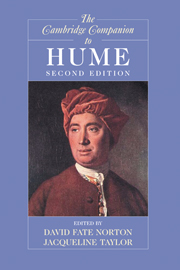Book contents
- Frontmatter
- 1 An Introduction to Hume’s Thought
- 2 Hume’s New Science of the Mind
- 3 Hume and the Mechanics of Mind: Impressions, Ideas, and Association
- 4 Hume’s Theory of Space and Time in Its Skeptical Context
- 5 Hume on Causation
- 6 Hume and the Problem of Personal Identity
- 7 Hume’s Skepticism
- 8 Hume’s Moral Psychology
- 9 The Foundations of Morality in Hume’s Treatise
- 10 Hume’s Later Moral Philosophy
- 11 The Structure of Hume’s Political Theory
- 12 Hume’s Principles of Political Economy
- 13 Hume on the Arts and “The Standard of Taste”: Texts and Contexts
- 14 David Hume: “The Historian”
- 15 Hume on Religion
- Appendix: Hume’s Autobiographies
- Selected Bibliography
- Index
- Series List
6 - Hume and the Problem of Personal Identity
Published online by Cambridge University Press: 28 May 2009
- Frontmatter
- 1 An Introduction to Hume’s Thought
- 2 Hume’s New Science of the Mind
- 3 Hume and the Mechanics of Mind: Impressions, Ideas, and Association
- 4 Hume’s Theory of Space and Time in Its Skeptical Context
- 5 Hume on Causation
- 6 Hume and the Problem of Personal Identity
- 7 Hume’s Skepticism
- 8 Hume’s Moral Psychology
- 9 The Foundations of Morality in Hume’s Treatise
- 10 Hume’s Later Moral Philosophy
- 11 The Structure of Hume’s Political Theory
- 12 Hume’s Principles of Political Economy
- 13 Hume on the Arts and “The Standard of Taste”: Texts and Contexts
- 14 David Hume: “The Historian”
- 15 Hume on Religion
- Appendix: Hume’s Autobiographies
- Selected Bibliography
- Index
- Series List
Summary
BACKGROUND
The problem of personal identity, as philosophers understand it today, emerged from the discussion of identity that Locke added to the second edition of The Essay concerning Human Understanding, published in 1694. In the forty-five years between the publication of that work and the publication of the Treatise, the literature on the problem of personal identity mushroomed, prompting Hume to observe wryly: “We now proceed to explain the nature of personal identity, which has become so great a question in philosophy, especially of late years in England, where all the abstruser sciences are study'd with a peculiar ardour and application” (T 1.4.6.15). Hume's own explanation of the nature of personal identity drew on the resources of his accounts of the imagination and the passions, and was therefore unique in many respects. Nevertheless, the debates of the preceding decades had covered considerable ground, and the distinctive features of Hume's own view emerge more clearly when seen in the context of what had come before.
Locke added the chapter Of Identity and Diversity to the second edition of his Essay to address issues about personal identity that arose from his arguments against the Cartesian view that the soul always thinks. Locke’s basic assumption was that questions about identity had to be understood in relation to the kind of object under consideration: one and the same object could instantiate different kinds, each of which would have different conditions of identity.
- Type
- Chapter
- Information
- The Cambridge Companion to Hume , pp. 177 - 208Publisher: Cambridge University PressPrint publication year: 2008
- 3
- Cited by



